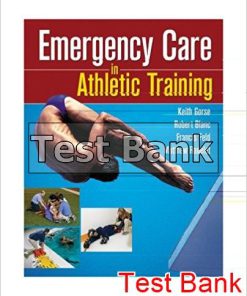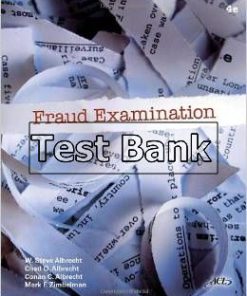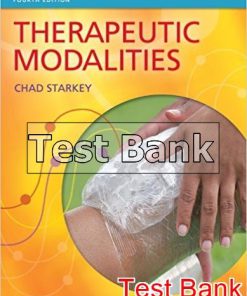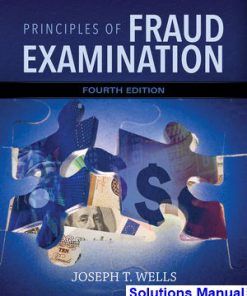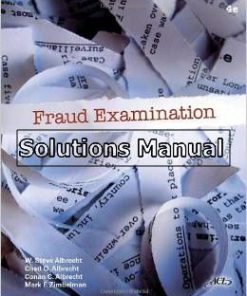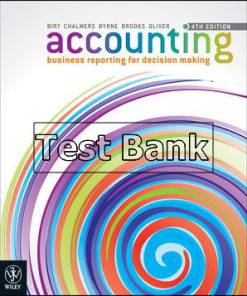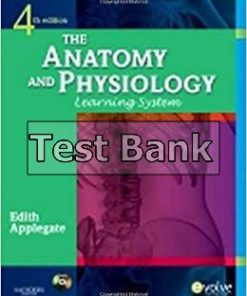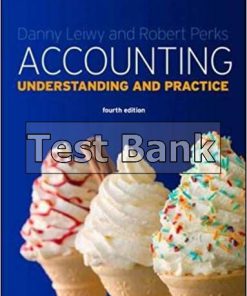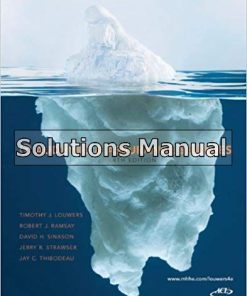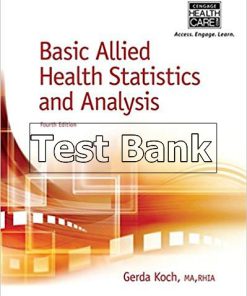Examination of Orthopedic Athletic Injuries 4th Edition Starkey Test Bank
$50.00 Original price was: $50.00.$26.50Current price is: $26.50.
Examination of Orthopedic Athletic Injuries 4th Edition Starkey Test Bank.
This is completed downloadable of Examination of Orthopedic Athletic Injuries 4th Edition Starkey Test Bank
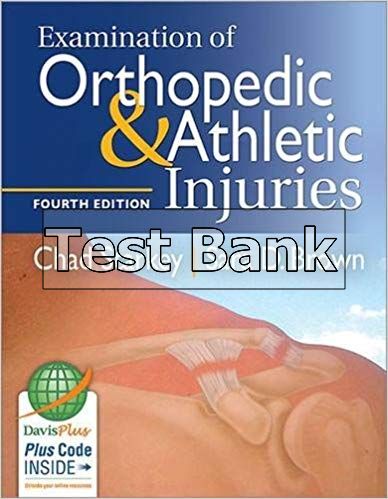
Product Details:
- ISBN-10 : 9780803639188
- ISBN-13 : 978-0803639188
- Author: Chad Starkey PhD AT FNATA (Author), Sara D. Brown MS LAT ATC (Author)
“This is by far the most comprehensive and user-friendly text for both professor and student! I am continuing to use it in my Athletic Training Program, and beginning next year, I will institute it into my PT courses in Ortho I & II.”—Vincent J. Hudson, MS, PT, ATC, MBA, University of Central Florida, Orlando, Florida, review of a previous edition.
Completely revised and updated, the 4th Edition of the field’s standard resource brings you all field’s most current knowledge and an all-new full-color art program. Its superb combination of detailed illustrations and precise language makes even the most complicated concepts and techniques clear.
Organized by body region, each chapter begins with a review of anatomy and biomechanics; proceeds through clinical evaluation, pathologies, and related special tests; and concludes with a discussion of on-field or initial management of specific injuries.
The Plus Code inside new, printed texts gives you access to the instructor and student resources online at DavisPlus, including your Davis Digital Version, range of motion animations, and review questions for every chapter.
Table of Content:
- SECTION 1 Foundations of Examination
- Chapter 1 Examination Process
- Differential Diagnosis
- Systematic Examination Technique
- The Examination Model
- Regional Interdependence
- The Role of The Uninjured Paired Structure
- Clinical Assessment
- History
- Physical Examination
- Functional Assessment
- Inspection
- Palpation
- Joint and Muscle Function Assessment
- Selective Tissue Tests
- Neurological Screening
- Vascular Screening
- Review of Systems
- The Role of Evidence in the Examination Process
- Chapter 2 Examination and Management of Acute Conditions
- Emergency Planning
- Sport-Specific Rules
- Critical Findings
- The On-Field Examination
- Equipment Considerations
- Primary Survey
- Secondary Survey
- On-Field History
- On-Field Inspection
- On-Field Palpation
- Palpation of Bony Structures
- On-Field Joint and Muscle Function Assessment
- On-Field Joint Stability Tests
- On-Field Neurological Testing
- On-Field Vascular Assessment
- Immediate Management
- Splinting
- Transportation
- Disposition
- Return-to-Play Decision Making
- Chapter 3 Evidence-Based Practice in the Diagnostic Process
- The Role of Evidence-Based Practice in Orthopedic Examination and Diagnosis
- Fundamentals of Interpreting Research
- Reliability
- Diagnostic Accuracy
- Diagnostic Gold Standard
- Diagnostic Predictive Value
- Sensitivity and Specificity
- Likelihood Ratios
- Positive Likelihood Ratio
- Negative Likelihood Ratio
- Interpreting Likelihood Ratios
- Clinical Decision Rules
- Clinical Practice Guidelines
- Outcome Measures
- Incorporating Evidence-Based Practice into Clinical Diagnosis
- Use of Evidence in This Text
- Chapter 4 Injury Pathology Nomenclature
- Tissue Response to Stress
- Stress–Strain Relationships
- Mechanisms of Injury
- Tensile Forces
- Compression Forces
- Shear Forces
- Torsion Forces
- Direct Blow
- Soft Tissue Pathology
- Musculotendinous Injuries
- Contusions
- Heterotopic Ossification
- Joint Structure Pathology
- Articular Surface Pathology
- Bony Pathology
- Exostosis
- Apophysitis
- Fractures
- Neurological and Vascular Pathologies
- Peripheral Nerve Injury
- Complex Regional Pain Syndrome
- Chapter 5 Musculoskeletal Diagnostic Techniques
- Imaging Techniques
- Radiography
- Computed Tomography Scan
- Magnetic Resonance Imaging
- Bone Scan
- Diagnostic Ultrasound
- Nerve Conduction Study/Electromyography
- Chapter 6 Assessment of Posture
- Clinical Anatomy
- The Kinetic Chain
- Muscular Function
- Muscle Imbalances
- Noncontractile Soft Tissue Influences
- Clinical Examination of Posture
- History
- Functional Assessment
- Inspection
- Views of Postural Inspection
- Palpation
- Muscle-Length Assessment
- Common Postural Deviations
- Foot and Ankle
- The Knee
- Spine and Pelvis
- Shoulder and Scapula
- Head and Cervical Spine
- Regional Interdependence
- Documentation of Postural Assessment
- Chapter 7 Evaluation of Gait
- Observational Gait Analysis
- Gait Terminology
- Walking Gait Phases
- Stance Phase
- Swing Phase
- Running Gait Cycle
- Stance Phase
- Swing Phase
- General Approach to Patient Evaluation
- History
- Physical Examination
- Observational Gait Analysis Findings
- Compensatory Gait Deviations
- Quantitative Gait Analysis
- SECTION 2 Lower Extremity Examination
- Chapter 8 Foot and Toe Pathologies
- Clinical Anatomy
- Zones of the Foot
- Articulations and Ligamentous Support
- Muscles Acting on the Foot and Toes
- Arches of the Foot
- Neurological Anatomy
- Vascular Anatomy
- Clinical Examination of the Foot and Toes
- History
- Functional Assessment
- Inspection
- Joint and Muscle Function Assessment
- Joint Stability Tests
- Neurological Examination
- Vascular Examination
- Region-Specific Pathologies and Selective Tissue Tests
- Influence of Foot Structure on Pathology
- Plantar Heel Pain
- Tarsal Coalition
- Tarsal Tunnel Syndrome
- Metatarsal Fractures
- Lisfranc Injuries
- Phalangeal Fractures
- Intermetatarsal Neuroma
- Hallux Rigidus
- Hallux Valgus
- First Metatarsophalangeal Joint Sprains
- Sesamoiditis
- On-Field Examination of Foot Injuries
- Equipment Considerations
- On-Field History
- On-Field Inspection
- On-Field Palpation
- On-Field Joint Function Tests
- On-Field Management of Foot Injuries
- Plantar Fascia Ruptures
- Fractures and Dislocations
- Chapter 9 Ankle and Leg Pathologies
- Clinical Anatomy
- Related Bony Structures
- Articulations and Ligamentous Support
- Muscles of the Leg and Ankle
- Bursae
- Neurological Anatomy
- Vascular Anatomy
- Clinical Examination of the Ankle and Leg
- History
- Functional Assessment
- Inspection
- Joint and Muscle Function Assessment
- Joint Stability Tests
- Neurological Assessment
- Vascular Assessment
- Region-Specific Pathologies and Selective Tissue Tests
- Ankle Sprains
- Ankle and Leg Fractures
- Achilles Tendon Pathology
- Peroneal Tendon Pathology
- Medial Tibial Stress Syndrome
- Stress Fractures
- Compartment Syndromes
- On-Field Examination of Leg and Ankle Injuries
- Equipment Considerations
- On-Field History
- On-Field Inspection
- On-Field Palpation
- On-Field Range of Motion Tests
- Initial Management of On-Field Injuries
- Ankle Dislocations
- Compartment Syndrome
- Chapter 10 Knee Pathologies
- Clinical Anatomy
- Articulations and Ligamentous Support
- The Menisci
- Muscles Acting on the Knee
- Neurological Anatomy
- Vascular Anatomy
- Clinical Examination of Knee Injuries
- History
- Past Medical History
- History of the Present Condition
- Functional Assessment
- Inspection
- Determination of Intracapsular versus Extracapsular Swelling
- Joint and Muscle Function Assessment
- Joint Stability Tests
- Neurological Assessment
- Vascular Testing
- Region-Specific Pathologies and Selective Tissue Tests
- Uniplanar Knee Sprains
- Rotational Knee Instabilities
- Meniscal Tears
- Osteochondral Lesions
- Iliotibial Band Friction Syndrome
- Popliteus Tendinopathy
- Knee Osteoarthritis
- Tibiofemoral Joint Dislocations
- On-Field Examination of Knee Injuries
- Equipment Considerations
- On-Field History
- On-Field Inspection
- On-Field Palpation
- On-Field Range of Motion Tests
- On-Field Ligamentous Tests
- On-Field Management of Knee Injuries
- Tibiofemoral Joint Dislocations
- Collateral and Cruciate Ligament Sprains
- Meniscal Tears
- Chapter 11 Patellofemoral Pathologies
- Clinical Anatomy
- Articulations and Ligamentous Support
- Muscular Anatomy and Related Soft Tissues
- Bursae of the Extensor Mechanism
- Clinical Examination of the Patellofemoral Joint
- History
- Functional Assessment
- Inspection
- Joint and Muscle Function Assessment
- Joint Stability Tests
- Neurological and Vascular Testing
- Region-Specific Pathologies and Selective Tissue Tests
- Patellofemoral Pain Syndrome
- Patellofemoral Instability
- Patellofemoral Tendinopathies
- Traumatic Conditions
- On-Field Evaluation of Patellofemoral Injuries
- Equipment Considerations
- On-Field History
- On-Field Palpation
- On-Field Functional Assessment
- Initial Management of On-Field Injuries
- Patellar Tendon Rupture and Patellar Fracture
- Chapter 12 Pelvis and Thigh Pathologies
- Clinical Anatomy
- Articulations and Ligamentous Support
- Muscular Anatomy
- Bursae
- Neurological Anatomy
- Vascular Anatomy
- Clinical Examination of the Pelvis and Thigh
- History
- Functional Assessment
- Inspection
- Joint and Muscle Function Assessment
- Joint Stability Tests
- Neurological Testing
- Region-Specific Pathologies and Selective Tissue Tests
- Iliac Crest Contusion
- Muscle Tears
- Quadriceps Contusion
- Slipped Capital Femoral Epiphysis
- Legg-Calvé-Perthes Disease
- Femoral Stress Fractures
- Intra-Articular Pathology
- Femoral Acetabular Impingement
- Labral Tears
- Hip Osteoarthritis
- Hip Subluxation
- Athletic Pubalgia
- Osteitis Pubis
- Piriformis Syndrome
- Snapping Hip Syndrome (Coxa Saltans)
- Bursitis
- On-Field Evaluation of Pelvis and Thigh Injuries
- Initial Evaluation and Management of On-Field Injuries
- Hip Dislocation
- Femoral Fracture
- SECTION 3 Torso Examination
- Chapter 13 Lumbosacral Pathologies
- Clinical Anatomy
- Bony Anatomy
- Intervertebral Discs
- Articulations, Ligamentous and Fascial Anatomy
- Neurological Anatomy
- Muscular Anatomy
- Clinical Examination of the Lumbar Spine
- History
- Nonorganic Origin of Pain
- Functional Assessment
- Inspection
- Joint and Muscle Function Assessment
- Joint Stability Tests
- Selective Tissue Tests
- Neurological Testing
- Region-Specific Pathologies and Selective Tissue Tests
- Spinal Stenosis
- Intervertebral Disc Lesions
- Segmental Instability
- Erector Spinae Muscle Tears
- Spondylopathies
- Sacroiliac Pathology
- On-Field Examination of Lumbar Spine Injuries
- On-Field History
- On-Field Inspection
- On-Field Neurological Tests
- On-Field Palpation
- On-Field Management of Lumbar Spine Injuries
- Lumbar Spine
- Chapter 14 Cervical and Thoracic Spine and Thorax Pathologies
- Clinical Anatomy
- Cervical Spine
- Thoracic Spine
- Intervertebral Discs
- Ligamentous Anatomy
- Neurological Anatomy
- Thorax
- Muscular Anatomy
- Clinical Examination of the Cervical and Thoracic Spine and Thorax
- History
- Functional Assessment
- Inspection
- Joint and Muscle Function Assessment
- Joint Stability Tests
- Neurological Testing
- Region-Specific Pathologies and Selective Tissue Tests
- Cervical Radiculopathy
- Clinical Cervical Instability
- Facet Joint Dysfunction
- Brachial Plexus Pathology
- Thoracic Outlet Syndrome
- Thoracic Spine Pathologies
- Thorax Pathologies
- Splenic Injury
- Kidney Trauma
- Commotio Cordis
- On-Field Evaluation and Management of Cervical and Thoracic Spine and Thorax Injuries
- Brachial Plexus Injury
- Thoracic Spine
- Rib Fractures
- Pneumothorax and Hemothorax
- Respiratory Distress
- SECTION 4 Upper Extremity Examination
- Chapter 15 Shoulder and Upper Arm Pathologies
- Clinical Anatomy
- Bony Anatomy
- Joints of the Shoulder Complex
- Muscles of the Shoulder Complex
- Bursae of the Shoulder Complex
- Clinical Examination of Shoulder Injuries
- History
- Functional Assessment
- Inspection
- Joint and Muscle Function Assessment
- Joint Stability Tests
- Neurological Testing
- Vascular Testing
- Region-Specific Pathologies and Selective Tissue Tests
- Scapulothoracic Articulation Pathology
- Sternoclavicular Joint Sprains
- Acromioclavicular Joint Pathology
- Glenohumeral Instability
- Anterior Instability
- Nontraumatic Anterior Instability
- Traumatic Anterior Instability
- Posterior Instability
- Acute Posterior Dislocation
- Rotator Cuff Pathology
- Biceps Tendon Pathology
- Adhesive Capsulitis
- On-Field Examination of Shoulder Injuries
- Equipment Considerations
- On-Field History
- On-Field Inspection
- On-Field Palpation
- On-Field Neurological Tests
- Initial Management of On-Field Shoulder Injuries
- Scapular Fractures
- Clavicular Injuries
- Chapter 16 Elbow and Forearm Pathologies
- Clinical Anatomy
- Articulations and Ligamentous Support
- Muscular Anatomy
- Nerves
- Bursae
- Clinical Examination of the Elbow and Forearm
- History
- Functional Assessment
- Inspection
- Joint and Muscle Function Assessment
- Active Range of Motion
- Manual Muscle Testing
- Passive Range of Motion
- Joint Stability Tests
- Neurological Testing
- Vascular Testing
- Region-Specific Pathologies and Selective Tissue Tests
- Elbow Dislocations
- Fractures About the Elbow
- Elbow Sprains
- Ulnar Collateral Ligament
- Radial Collateral Ligament
- Osteochondritis Dissecans of the Capitulum
- Epicondylalgia
- Lateral Epicondylalgia
- Medial Epicondylalgia
- Distal Biceps Tendon Rupture
- Nerve Pathology
- Forearm Compartment Syndrome
- On-Field Examination of Elbow and Forearm Injuries
- On-Field History
- On-Field Inspection
- On-Field Palpation
- On-Field Joint and Muscle Function Tests
- On-Field Neurological Tests
- On-Field Management of Elbow and Forearm Injuries
- Elbow Dislocations
- Fractures About the Elbow
- Chapter 17 Wrist, Hand, and Finger Pathologies
- Clinical Anatomy
- Articulations and Ligamentous Support
- Muscular Anatomy
- Nerves
- The Carpal Tunnel
- Clinical Examination of Injuries to the Wrist, Hand, and Fingers
- History
- Functional Assessment
- Inspection
- Joint and Muscle Function Assessment
- Wrist Joint and Muscle Function Assessment
- Thumb Joint and Muscle Function Assessment: Carpometacarpal Joint
- Finger Joint and Muscle Function Assessment
- Joint Stability Tests
- Wrist and Hand Joint Play Assessment
- Neurological Testing
- Vascular Testing
- Region-Specific Pathologies and Selective Tissue Tests
- Wrist Pathology
- Hand Pathology
- Finger Pathology
- Thumb Pathology
- On-Field Evaluation and Management of Wrist, Hand, and Finger Injuries
- Wrist Fractures and Dislocations
- Interphalangeal Joint Dislocations
- Hand and Finger Fractures
- Lacerations
- SECTION 5 Examination of the Head
- Chapter 18 Eye Pathologies
- Clinical Anatomy
- Eye Structures
- Clinical Examination of Eye Injuries
- History
- Muscular Anatomy
- Visual Acuity
- Inspection
- Functional Assessment
- Neurological Testing
- Region-Specific Pathologies and Selective Tissue Tests
- Orbital Fractures
- Corneal Abrasions
- Corneal Lacerations
- Traumatic Iritis
- Hyphema
- Retinal Detachment
- Ruptured Globe
- Conjunctivitis
- Foreign Body Embedment
- On-Field Examination and Management of Eye Injuries
- Contact Lens Removal
- Orbital Fractures
- Penetrating Eye Injuries
- Chemical Burns
- Chapter 19 Face and Related Structure Pathologies
- Clinical Anatomy
- Temporomandibular Joint Anatomy
- The Ear
- The Nose
- The Throat
- The Mouth
- The Teeth
- Muscular Anatomy
- Clinical Examination of Facial Injuries
- History
- Inspection
- Functional Assessment
- Neurological Testing
- Region-Specific Pathologies and Selective Tissue Tests
- Ear Pathology
- Nasal Injuries
- Throat Injury
- Facial Fractures
- Dental Conditions
- Temporomandibular Joint Dysfunction
- On-Field Examination and Management of Injuries to the Face and Related Areas
- Lacerations
- Laryngeal Injuries
- Facial Fractures
- Temporomandibular Joint Injuries
- Nasal Fracture and Epistaxis
- Dental Injuries
- Chapter 20 Head and Acute Cervical Spine Pathologies
- Clinical Anatomy
- The Brain
- The Meninges
- Cerebrospinal Fluid
- Blood Circulation in the Brain
- Examination Scenarios
- Evaluation of the Athlete’s Position
- Examination of Head Injuries
- Determination of Consciousness
- History
- Inspection
- Palpation
- Functional Assessment
- Cranial Nerve Function
- Neurocognitive Function
- Vital Signs
- Region-Specific Pathologies and Selective Tissue Tests
- Traumatic Brain Injury
- Concussion
- Concussion Assessment Tools
- Diffuse Cerebral Swelling (Second impact syndrome)
- Postconcussion Syndrome
- Intracranial Hemorrhage
- Home Instructions
- Skull Fractures
- Examination of Acute Cervical Spine Injuries
- History
- Inspection
- Functional Assessment
- Neurological Assessment
- Acute Cervical Spine Trauma
- On-Field Examination and Management of Cervical Spine Injuries and the Unconscious Athlete
- Equipment Considerations
- Initial Inspection
- Initial Action
- History
- Inspection
- Neurological Testing
- Removing the Athlete From the Field
- Appendix A Diagnostic Evidence References
- Index
People Also Search:
examination of orthopedic athletic injuries starkey
examination of orthopedic athletic injuries 4th edition starkey
examination of orthopedic athletic injuries 4th edition
examination of orthopedic athletic injuries 4th edition download scribd
examination of orthopedic athletic injuries 4th edition testbank download pdf
Instant download after Payment is complete
You may also like…
Solutions Manual
Related products
Solutions Manual
Auditing And Assurance Services 4th Edition Louwers Solutions Manual




